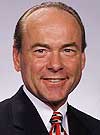When the Nebraska-Omaha Mavericks joined the CCHA as a full member team in the 1999-2000 season, they surprised everyone with a league playoff run that ended only when Michigan State beat them for the CCHA championship in Joe Louis Arena.
To get to that point, the Mavericks had to take a first-round, best-of-three playoff series in Marquette from Northern Michigan, then beat Bowling Green — a founding member of the league — in a single play-in game, and then get past the fabled Michigan Wolverines in a semifinal match in Detroit.
This year, the Mavericks make their first-ever NCAA appearance, and to get there, they had to do absolutely nothing.
Well, not last weekend, anyway.

When the rest of the CCHA was battling for the Mason Cup in Detroit last weekend, the Mavs were sitting in Omaha after being eliminated from the league’s postseason tournament by Northern Michigan in two straight games the weekend before. The secret to UNO’s NCAA postseason invitation success was the ability to take care of business early in the season, and the luck of drawing a regular-season cluster that included Michigan and Michigan State.
“It’s based on your nonconference competition,” said Mike Kemp, the only head coach UNO has ever known. “The other thing is that if you don’t win the league and finish in the top two and you’re not in a cluster with Michigan or Michigan State, you’re not getting in.”
Since wins against strong competition in part help a team’s chances of earning an invitation to the NCAA tournament, Kemp and other savvy coaches around the country have begun scheduling nonconference opponents early in the season that they believe will be in the mix at the end of the year. For UNO this year, that meant playing New Hampshire and Providence, and beating them both.
And since there are 12 teams in the CCHA, every team is “clustered” with three other teams for the course of the season. Each team has a permanent “rival partner” — for Nebraska-Omaha, it’s Alaska-Fairbanks — and teams play other teams within their cluster for a total of four times in the season…and everyone else in the league just twice.
Not surprisingly, Michigan and Michigan State are rival partners, so anyone who draws that cluster can potentially benefit from those programs’ successful seasons.
This year, the Mavericks went 4-3-1 combined against the Wolverines and the Spartans, finished fifth in the final CCHA standings, and come in to their first NCAA playoff game against Boston University with a record of 20-14-6 overall.
“You know, it’s really quite something to have done this in just our ninth season,” said Kemp. “I look at some of the storied programs in the league…Notre Dame, it took them 30-some years to get to an NCAA bid, Ohio State it was 25 to get to an NCAA bid, for us to accomplish this in nine years, we feel a deep sense of appreciation for everyone who’s helped to build this program.”
Included among those to whom Kemp feels such deep gratitude is the rabid lot of Maverick fans, faithful from the very beginning. Kemp is keenly aware of the potential to let them down, as if that could ever happen. “From that standpoint, we hope that we carry it through for them.”
Also on the gratitude list are many former UNO players, some of whom took that initial risk on a school in Nebraska trying to build a hockey program far away from any other Division I competition.
Five former Mavericks have gone on to see at least some NHL action, including goaltenders Dan Ellis (Dallas) and Chris Holt (New York Rangers), forward Jeff Hoggan (St. Louis), and defensemen Bryce Lampman (New York Rangers) and Greg Zanon (Nashville). Each of them keeps in touch with Kemp and the team.
“I’ve been fielding calls all week,” said Kemp, especially from former players who were “among the first recruits to first buy into the program. Those guys called to wish us good luck.
“I know they’re very, very proud. When the bid came out on Sunday, I got a call from Jeff Hoggan within half an hour.” Hoggan, on injured reserve with the Saints, spent the 2004-2005 season with the Ice Cats in Worcester, site of the East Regional. Worcester is commonly known in college hockey circles as one of the least glamorous of rinks to host a regional, but Kemp said that because of his connection to Worcester and the possibility of getting attending, Hoggan is excited that the Mavericks drew Worcester.
“He’s the one,” said Kemp.
Kemp’s notorious wit, warm personality, and hockey smarts were three of the key ingredients for building a hockey program from scratch in Omaha. Zanon said that once he met with Kemp — “Kemper” to those who know and love him — he knew he’d be headed for the deep Midwest.
“He’s one of the main reasons I picked to go there, to help start up the program,” said Zanon, who was among the first of Kemp’s recruits. “He was very good from the very first time I met him, when he came to talk to me about playing for a new team.
“It was good for a lot of guys. Because it was a new program, I knew it would give me a chance to play.”
Kemp is the kind of guy that players can go to with anything, said Zanon. “I think he’s a very good teacher. He’s got a lot of patience with the players. You can talk to him about anything — hockey, school, life.”
His affable nature and sense of humor make Kemp a favorite among players, coaches, fans, and press. Kemp is good at gently teasing someone he likes, but he takes as well as he gives, said Zanon.
“He’s very easy going. I think it was my third year when me and Joe Pereira filled his stick with water. He’s just little guy so we thought we’d have some fun. You fill an aluminum stick with water, and it’s heavy.”
Ellis, who left the program for the pros just before the start of his senior season, said that Kemp was fair with players and rewarded those who worked hard. “He played me almost every single game when I was there. Probably the biggest thing that I was able to take away from that was game experience. You learn to be prepared each and every night.”
Understandably, both Zanon and Ellis feel a sense of accomplishment this weekend. “You’ve got to see good things now,” said Zanon. “Getting into the tournament…it’s going to create more attention. Now we’ll be able to get players that are new up-and-comers, compete with Michigan and Michigan State for recruits.”
“It’s a proud moment in any Maverick’s life when the team starts from scratch and is able to make it to this level of play in a such a short period of time,” said Ellis. “We’ve always had a team that’s kind of close but never able to get over that hump. They have the team makeup to do something really special this year.”
Also by Paula C. Weston on UNO: Prairie Ponderings.


